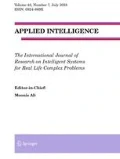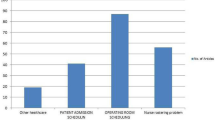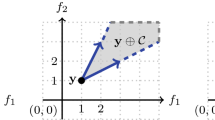Abstract
This paper introduces an extension to the well-established Resource-Constrained Project Scheduling Problem for the comprehensive description of disruption management problems. This conceptual framework employs the concept of alternative activities to consider both the temporal shift of activities or the reallocation of resources and switches from one valid process variant to another one. Activities can be serialized or parallelized, process steps can be inserted or removed and durations as well as resource requirements can be modified dynamically during optimization. Focusing on the domain of the aircraft turnaround as the most important airport ground process, we illustrate how the Extended RCPSP (x-RCPSP) can be applied for decision support. A specific evolutionary algorithm is presented that identifies good-quality solutions to relatively large disruption management problems within only a few seconds. The results of the evaluation illustrate fast convergence on good or optimal schedules and serve as a basis for the development of future problem solving algorithms.
Similar content being viewed by others
References
Wambsganss M (1997) Collaborative decision making through dynamic information transfer. Air Traffic Control Q 4:107–123
Hoffman R, Ball M, Odoni A, Hall W, Wambsganss M (1999) Collaborative decision making in air traffic flow management, Technical Report, UC Berkeley
Carr FR (2004) Robust decision support tools for airport surface traffic, PhD dissertation, Massachusetts Institute of Technology
Carr F, Theis G, Clarke J-P, Feron E (2005) Evaluation of improved pushback forecasts derived from airline ground operations data. J Aerosp Comput Inf Commun 2(1):25–43
Qi X, Bard JF, Yu G (2006) Disruption management for machine scheduling: The case of spt schedules. Int J Prod Econ 103(1):166–184
Fox MS, Smith S (1984) Isis: A knowledge based system for factory scheduling. Expert Syst 1(1)
Smith SF, Muscettola N, Matthys DC, Ow PS, Potvin J-Y (1990) Opis: An opportunistic factory scheduling system. In: IEA/AIE ’90: Proc 3rd international conference on industrial and engineering applications of artificial intelligence and expert systems. ACM, New York, pp 268–274
Zweben M, Davis E, Daun B, Deale MJ (1993) Scheduling and rescheduling with iterative repair. IEEE Trans Syst Man Cybern 23(6):1588–1596
Deale M, Yvanovich M, Schnitzuius D, Kautz D, Carpenter M, Zweben M, Davis G, Daun B (1994) The space shuttle ground processing scheduling system. In: Zweben M, Fox M (eds) Intelligent scheduling. Morgan Kaufmann, San Mateo, pp 423–449
Minton S, Johnston MD, Philips AB, Laird P (1992) Minimizing conflicts: A heuristic repair method for constraint satisfaction and scheduling problems. Artif Intell 58(1–3):161–205
Kirkpatrick S, Gelatt C, Vecchi M (1983) Optimization by simulated annealing. Science 220(4589):671–680
Herroelen W, Leus R (2005) Project scheduling under uncertainty: Survey and research potentials. Eur J Oper Res 165:289–306
Van de Vonder S, Demeulemeester E, Herroelen W (2007) A classification of predictive-reactive project scheduling procedures. J Sched 10(3):195–207
Vieira GE, Herrmann JW, Lin E (2003) Rescheduling manufacturing systems: a framework of strategies, policies, and methods. J Sched 6(1):39–62
Aytug H, Lawley MA, McKay K, Mohan S, Uzsoy R (2005) Executing production schedules in the face of uncertainties: A review and some future directions. Eur J Oper Res 161(1):86–110
Clausen J, Hansen J, Larsen J, Larsen A (2001) Disruption management. OR/MS Today 28:40–43
Larsen J, Løve M, Sørensen KR, Clausen J (2002) Disruption management for an airline—rescheduling of aircraft. In: Cagnoni S, Gottlied J, Hart E, Middendorf M, Raidl GR (eds) Applications of evolutionary computing. Lecture notes in computer science, vol 2279. Springer, Berlin, pp 315–324
Løve M, Sørensen KR, Larsen J, Clausen J (2005) Using heuristics to solve the dedicated aircraft recovery problem. Cent Eur J Oper Res 13(2):189–207
Yang J, Qi X, Yu G (2005) Disruption management in production planning. Nav Res Logist 52(5):420–442
Bean J, Birge J, Mittenthal J, Noon C (1991) Matchup scheduling with multiple resources, release dates and disruptions. Oper Res 39:470–483
Xia Y, Yang M-H, Golany B, Gilbert SM, Yu G (2004) Real-time disruption management in a two-stage production and inventory system. IIE Trans 36(2):111–125
Yu G, Qi X (2004) Disruption management: framework, models and applications. World Scientific, Singapore
Zhu G, Bard JF, Yu G (2005) Disruption management for resource-constrained project scheduling. J Oper Res Soc 56:365–381
Xu M, Qi X, Yu G, Zhang H, Gao C (2003) The demand disruption management problem for a supply chain system with nonlinear demand functions. J Syst Sci Syst Eng 12(1):82–97
Qi X, Bard JF, Yu G (2004) Supply chain coordination with demand disruptions. Omega 32:301–312
EUROCONTROL Performance Review Commission (2004) Evaluating the true cost to airlines of one minute of airborne or ground delay. http://www.eurocontrol.int/prc
Shavell ZA (2001) The effects of schedule disruptions on the economics of airline operations. In: Donohue GL, Zellweger A (eds) Air transportation systems engineering. AIAA Press, Reston
Adeleye S, Chung C (2006) A simulation based approach for contingency planning for aircraft turnaround operation system activities in airline hubs. J Air Transp 11(2):140–155
Wu C-L, Caves RE (2004) Modelling and simulation of aircraft turnaround operations at airports. Transp Plan Technol 27(1):25–46
Ashford N, Stanton HM, Moore CA (1997) Airport operations, 2nd edn. McGraw–Hill, New York
Błazewicz J, Lenstra JK, Rinnooy Kan A (1983) Scheduling projects to resource constraints: Classification and complexity. Discrete Appl Math 5:11–24
Brucker P, Drexl A, Möhring R, Neumann K, Pesch E (1999) Resource-constrained project scheduling: Notation, classification, models, and methods. Eur J Oper Res 112:3–41
Kolisch R, Hartmann S (2006) Experimental investigation of heuristics for resource-constrained project scheduling: An update. Eur J Oper Res 174:23–37
Hartmann S (2001) Project scheduling with multiple modes: A genetic algorithm. Ann Oper Res 102(1–4):111–135
Artigues C, Michelon P, Reusser S (2003) Insertion techniques for static and dynamic resource constrained project scheduling. Eur J Oper Res 149:249–267
Elkhyari A, Guéret C, Jussien N (2004) Constraint programming for dynamic scheduling problems. In: Kise H (ed.) ISS’04 international scheduling symposium, Awaji, Hyogo, Japan, pp 84–89
Beck J, Fox M (2000) Constraint directed techniques for scheduling with alternative activities. Artif Intel 121:211–250
Li R, Shyu Y, Sadashiv A (1993) A heuristic rescheduling algorithm for computer-based production scheduling systems. Int J Prod Res 31(8):1815–1826
Herrero JG, Berlanga A, Molina JM (2005) Methods for operations planning in airport decision support systems. Appl Intel 3(22):183–206
Goldberg DE (1989) Genetic algorithms in search, optimization and machine learning. Addison–Wesley, Boston
Hindi K, Yang H, Fleszar K (2002) An evolutionary algorithm for resource-constrained project scheduling. IEEE Trans Evol Comput 6(5):512–518
Kolisch R, Hartmann S (1999) Heuristic algorithms for solving the resource-constrained project scheduling problem: Classification and computational analysis. In: Weglarz J (ed) Project scheduling: recent models, algorithms, and applications. Kluwer Academic, Dordrecht, pp 147–178
Hartmann S (1998) A competitive genetic algorithm for resource-constrained project scheduling. Nav Res Logist 45:733–750
Policella N, Rasconi R (2005) Testsets generation for reactive scheduling. In: Workshop on experimental analysis and benchmarks for AI algorithms, Ferrara, Italy
Kolisch R, Sprecher A, Drexl A (1995) Characterization and generation of a general class of resource-constrained project scheduling problems. Manag Sci 41:1693–1703
Viana A, de Sousa JP (2000) Using metaheuristics in multiobjective resource constrained project scheduling. Eur J Oper Res 120(2):359–374
Cowling P, Colledge N, Dahal K, Remde S (2006) The trade off between diversity and quality for multi-objective workforce scheduling. In: Lecture notes in computer science, vol 3906. Springer, Berlin, pp 13–24
Laborie P (2005) Complete MCS-based search: Application to resource constrained project scheduling. In: Kaelbling LP, Saffiotti A (eds) IJCAI-05 proceedings of nineteenth international joint conference on artificial intelligence, Edinburgh, Scotland, pp 181–186
Alcaraz J, Maroto C, Ruiz R (2003) Solving the multi-mode resource-constrained project scheduling problem with genetic algorithms. J Oper Res Soc 54(6):614–626
Kuster J, Jannach D, Friedrich G (2007) Local rescheduling—a novel approach for efficient response to schedule disruptions. In: IEEE symposium on computational intelligence in scheduling, Honolulu, USA, pp 79–86
Kuster J, Jannach D (2006) Handling airport ground processes based on resource-constrained project scheduling. In: Ali M, Dapoigny R (eds) Advances in applied artificial intelligence. Lecture notes in computer science, vol 4031. Springer, Berlin, pp 166–176
Kuster J, Jannach D (2006) Extending the resource-constrained project scheduling problem for disruption management. In: Proceedings of the 3rd IEEE conference on intelligent systems. IEEE Press, London, pp 95–102
Kuster J, Jannach D, Friedrich G (2007) Handling alternative activities in resource-constrained project scheduling problems. In: IJCAI-07, proceedings of the twentieth international joint conference on artificial intelligence. Hyderabad, India, pp 1960–1965
Author information
Authors and Affiliations
Corresponding author
Rights and permissions
About this article
Cite this article
Kuster, J., Jannach, D. & Friedrich, G. Extending the RCPSP for modeling and solving disruption management problems. Appl Intell 31, 234–253 (2009). https://doi.org/10.1007/s10489-008-0119-x
Received:
Accepted:
Published:
Issue Date:
DOI: https://doi.org/10.1007/s10489-008-0119-x




